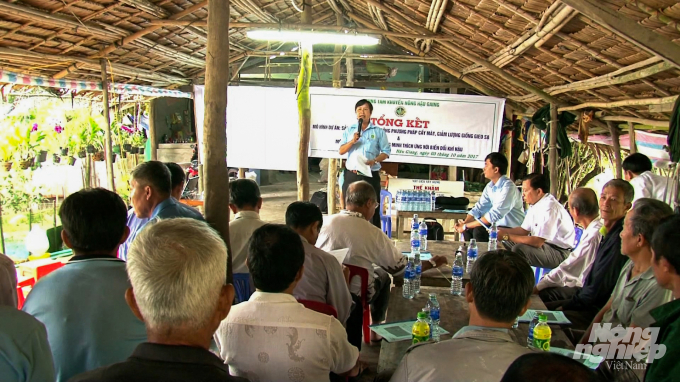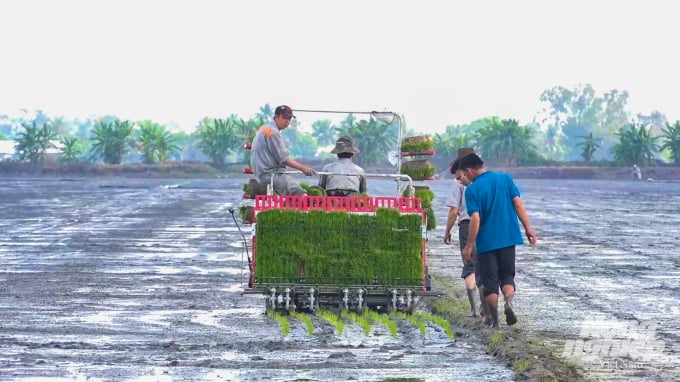November 28, 2025 | 04:19 GMT +7
November 28, 2025 | 04:19 GMT +7
Hotline: 0913.378.918
November 28, 2025 | 04:19 GMT +7
Hotline: 0913.378.918
Phuoc Loc Agriculture Cooperative located in Chau Thanh A district, Hau Giang province is one of the farmer organizations have received support from the Vietnam Sustainable Agriculture Transformation Project (VnSAT). Since 2015, the cooperative's members have bravely adopted sustainable farming methods to their fields; thereby increasing the area under rice cultivation to more than 400 hectares.
Tran Trung Kien, Director of Phuoc Loc Agriculture Cooperative said VnSAT invested nearly VND 8 billion into the cooperative to build warehouse, drying room on an area of 3,000 square meters. Currently, Phuoc Loc cooperative has become the focal point that buys rice from not only its members and affiliate groups but also other rice growers in the province. The cooperative can buy up to 5 tons of rice every crop. According to Kien the most important thing is that the local farmers are getting used to production on demand, focusing on cultivating high-quality rice varieties that meet the standards of food safety and export markets.
After nearly 7 years of implementation, the project has brought positive results to Hau Giang province such as synchronous infrastructure, creating awareness among farmers for the adoption of sustainable rice farming practices.

A training course on sustainable rice farming practices. Photo: Kim Anh.
Vo Minh Phuc, Deputy Director of Hau Giang VnSAT project said "During the implementation of the project, enterprises also realized the importance of the project and pledged to buy paddy rice grown in some certain project areas. Over the past years, the local farmers have benefited from the project and Hau Giang province met even exceeded the targets set by the project."
Le Van Hien, Director of VnSAT project said the project has brought massive changes to the rice industry in the Mekong Delta . Hien added "The most important thing is that the project has changed farming habits of the local farmers even after it finished."
Moreover, the investments in infrastructures will have a great impact on building new-style rural areas in the region. With traffic, irrigation infrastructures, power line system and warehouses developed methodically, rural life in the South has been improved significantly, contributing to the completion of the goals of building new rural areas.
Keeping in close touch with farmers and giving them assistance along with focused investment are what farmers need and VnSAT project has met that expectation. At a conference held on March 16, 2022 to speed up the progress of Year Plan for 2022 - Rice Component of Project Management Unit VnSAT, Deputy Minister of Agriculture and Rural Development Le Quoc Doanh assessed that rice component in the Mekong Delta in particular developed intensively in terms of quality. Notably, 77% of the area under rice cultivation in the Mekong Delta is planted with high-quality varieties. Adopting technical advances has helped farmers reduce the cost of rice production

Farmers have bravely changed their farming habits with the introduction of mechanization to production. Photo: Kim Anh.
Deputy Minister Le Quoc Doanh expressed "Since 2015 when we implemented the project people talked a lot about rice quality. Especially, in 2021 when the Covid-19 pandemic spread widely rice-growing area were reduced by about 40,000 hectares a year to make room for other farming models and other crops. According to the statistics, up to 77% of the area under high-quality rice varieties were introduced with advanced techniques, and thus, production costs could be cut down.
According to Project Management Unit VnSAT, in 2021 the Mekong Delta provinces organized training courses on "3G3T" (3 reductions 3 increases) technique for more than 155,000 farmers who cultivated rice on 213,500 hectares. At the same time, the provinces in the project areas trained at least 104,000 farmers on "1P5G" (1 must 5 reductions) technique on a growing area of 146,800 hectares. The results achieved were far better than expectations.
VnSAT project will invest into three phases to support farmer organizations and cooperatives in 8 Mekong Delta provinces. Under the project, 91 sub-projects have been implemented. Among them 88 sub-projects have been completed and put into operation so far.
With the assistance of VnSAT, 53 pumping stations, 181 kilometers of road, 39 warehouses with a capacity of above 41,000 tons, 25 drying machines have been invested to improve rice value in the Mekong Delta.
Translated by Mai Tham

(VAN) According to Mr. Vo Minh Thanh, Director of the Tay Ninh Department of Agriculture and Environment, Resolution 57 has created a new development pathway for the locality, shifting from traditional toward modern agriculture.
/2025/11/26/4909-2-154329_878.jpg)
(VAN) Pearl grouper farming in HDPE cages not only delivers economic efficiency but also contributes to protecting the environment, creating jobs, and promoting marine-based experiential tourism.

(VAN) The model of making a living under the forest canopy through the agroforestry system in Van Son commune, Bac Ninh province, is expected to generate an annual income of approximately VND 30 million/ha.

(VAN) Many enterprises in Can Tho are harnessing natural energy and reducing greenhouse gas emissions in their production processes, thereby contributing to the promotion of a sustainable green transition.
/2025/11/24/3536-2-112800_176.jpg)
(VAN) Dong Nai now has tens of thousands of hectares of forests certified for sustainable management, and this area will continue to be expanded in the coming period.

(VAN) Vinh Ha hamlet (Dai Xuyen commune, Hanoi) is shifting away from small-scale farming as households adopt bioscurity into their breeder chicken models.

(VAN) Heavy rains make aquatic species more vulnerable to disease. Proactive water management and high-tech systems help farmers prevent outbreaks and protect yields.